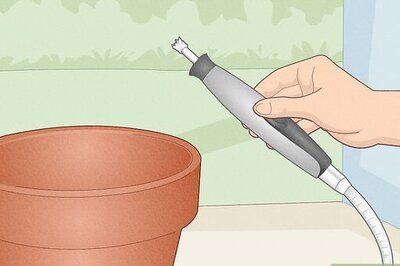
views
The first IVF baby, Louise Brown, was born in 1978 in Oldham and District General Hospital, Manchester, England. In vitro fertilization, popularly known as IVF, is an extraordinary technique in which a woman’s eggs are fused with a man’s sperm in a special laboratory to create one or more embryos (first stage of a baby). In this procedure, the embryo is transported to the woman’s uterus through her cervix to enhance her chances of pregnancy. Since the fusion of male and female eggs occurs in a laboratory, the baby was also commonly called a test tube baby.Who requires IVF treatment?
Primarily, women beyond their advanced reproductive age (above the age of 35 years), who have been trying to get pregnant through unprotected sex for two years or more, can get IVF treatment.
However, women who fit any of the following criteria may also be allowed to get an IVF treatment: an infertile partner, absence of or a blockage in the fallopian tube (the tube joining ovaries to the womb) or if one is suffering from endometriosis or another ovulation disorders.How is IVF treatment done?
Before the procedure, the doctors review the medical conditions of the woman seeking the treatment. The doctor may change the course of any medications that may affect the process of fertilization. The woman is asked to quit consuming tobacco and alcohol in any form.
There are six stages of IVF treatment:
- The doctors suppress the natural menstrual cycle of the woman with the help of medications.
- The doctors then give some medications to the woman which would stimulate the ovaries to produce more eggs than usual.
- Ultrasound scans are done every few days to monitor the progress and maturation of the eggs. The doctor may give some medications to the woman that'll help the eggs mature.
- After a while, doctors collect the eggs using a needle which is inserted from the vagina into the ovaries.
- The eggs are then mixed with the sperm and are allowed to stay inside the incubator in the lab until they fuse with each other to form an embryo.
- Once the embryo is formed, it is transferred to the uterus of the woman.
What are the success rates of IVF treatment?
It is believed that the success rate of IVF treatment depends on many factors with the major one being the age of the woman. Different reports put the success rate to be between 25-35%, with women under the age of 40 years to be more likely to have a successful pregnancy. The chances of success also decrease with each try and can be cut by 50% in women who smoke.What are the risks associated with IVF treatment?
IVF is an expensive procedure that does not guarantee a successful pregnancy. Moreover, sometimes it can bear complications such as hot flushes, headaches or even ovarian hyperstimulation syndrome where too many eggs develop in the ovaries. In some cases, there can be multiple fusions of the egg and the sperms leading to the birth of unplanned twins or triplets.
Additionally, IVF can sometimes lead to an ectopic pregnancy, where the embryo gets implanted outside of the uterus and usually in the fallopian tubes.For more information, read our article on In Vitro Fertilization and Test Tube Baby.Health articles on News18 are written by myUpchar.com, India’s first and biggest resource for verified medical information. At myUpchar, researchers and journalists work with doctors to bring you information on all things health.Follow @News18Lifestyle for more




















Comments
0 comment